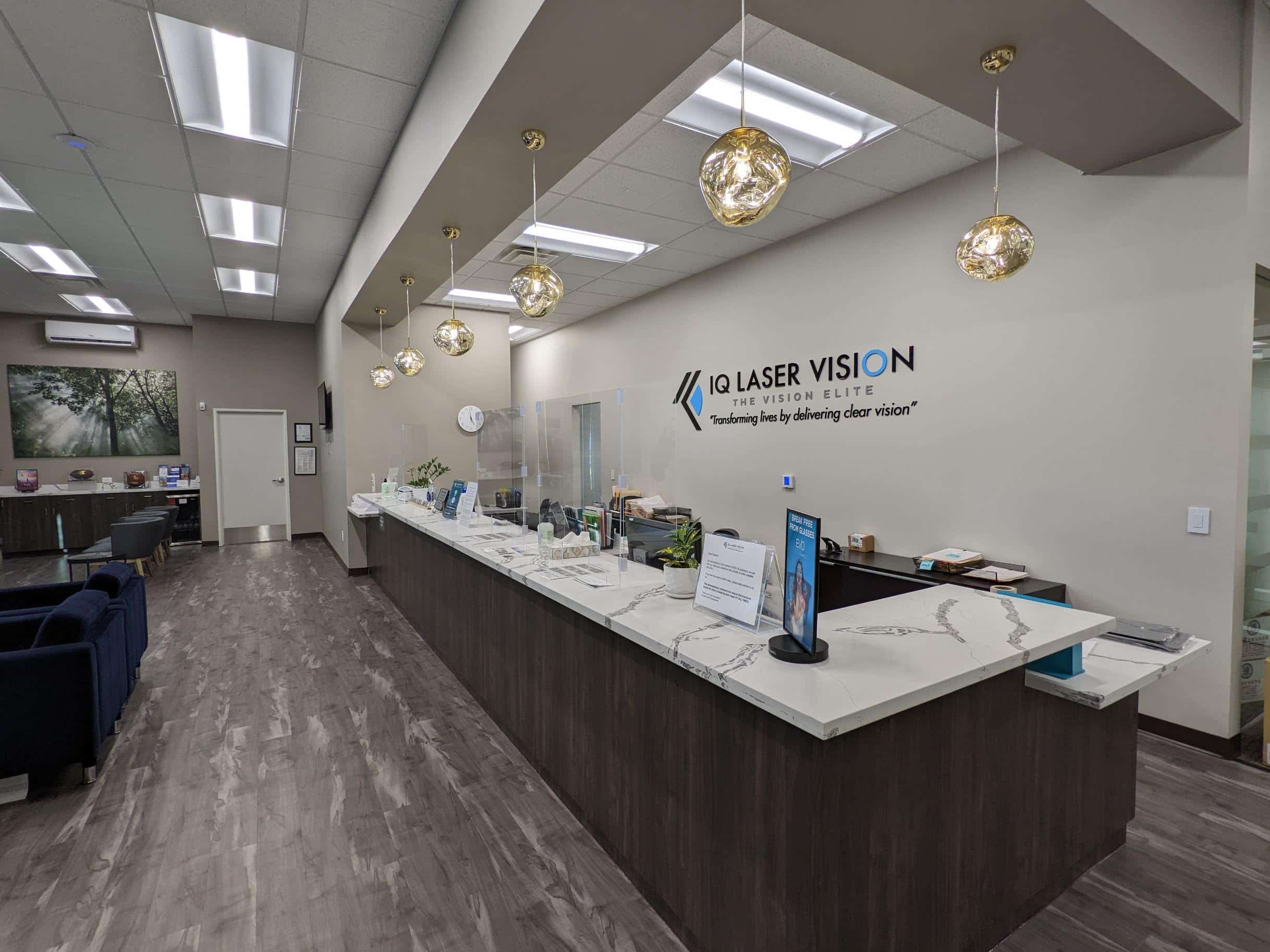Does your vision seem blurry or hazy? Has it become harder to complete everyday tasks because you can't see?
These are some of the more common symptoms that come with having cataracts. Cataracts are an almost inevitable part of the aging process that everyone will develop.
When you have cataracts, it may seem like you're losing your way of life, but with cataract surgery, you can regain clear vision. The surgeons at IQ Laser Vision are skilled and experienced in all avenues of cataract surgery and diagnosis.
Before you have cataracts, you can see clearly. Cataracts form in the lens of the eye, which needs to be clear to control how much light enters the retina.
If you have a cataract, the lens becomes cloudy due to proteins in the lens clumping together. With cataracts, your vision will get blurry if there isn’t enough light filtering into the retina.
With a cataract, you can no longer see through the lens easily. You may not even realize you have a cataract at first! Some patients can have cataracts for years or even decades without noticing.
A cataract can start with gradual blurry vision, or only some spots that you can't quite see out of. Over time, your cataracts will start to worsen. When this happens, you may start to notice that your vision is severely impacted. Some people have cataracts in both eyes.
If you have cataracts in both eyes, one cataract may be worse than the other. You could also only have one cataract in one eye.
There are many signs that go along with having a cataract. Although the most common sign is blurry vision, other signs include:






If you experience any of these signs or any sudden vision changes, talk to your eye doctor at IQ Laser Vision in Rowland Heights and other convenient locations. Although they sound like they could be cataracts, the only way to know for sure is to see your eye doctor.
They will evaluate any serious eye conditions or diseases during your eye exam.
Aging is the most common cause of developing cataracts. During middle age, it becomes more common to have hardened, thicker lenses. The tissues in the lens can break down and form proteins that make the lens cloudy. Over time, this makes your vision blurry. Your blurry vision will only get worse as you continue getting older. It may sound young, but you can start to develop cataracts as young as 40 or 50 years old!
Even if you have cataracts at this age, you may not realize it, since they probably won’t affect your sight. But the blurry vision and other signs that go with cataracts will get worse with time.
If you're older than 60, you're more likely to experience issues with your vision from cloudy lenses. If you've had any eye trauma or previous eye surgery, these can also cause cataracts by damaging the lens and limiting the light that reaches the retina.
If you're a diabetic, you’re more likely to develop cataracts since high blood sugar can increase fluid in the retina. Reduce your risks of developing cataracts by keeping your blood sugar as under control as you can! Even the medications you take can increase your risk of developing cataracts! Be careful if you take steroids or need radiation treatment. Talk to your doctor if you’re concerned about these side effects.
You can even be born with cataracts or develop them as a child. This is most likely to occur after an eye injury or an eye infection.

Love it! In the end, it is completely like being young again. The technique is top of the line and I wonder why I can see so clearly now, I see every pore. Only two weeks have passed and already I can thread the needle. I must say that the procedure is awesome!
If you have cataracts that are in the early stages, you may be able to get away with only needing prescription glasses. Talk to your eye doctor if you’ve increased your prescriptions frequently but your vision no longer feels like it’s improving. This is a common sign that it’s often time for cataract surgery. Cataracts only affect the lens, which makes some people think it’s fine to delay surgery. Most cataract surgeons recommend having cataract surgery when cataracts start to seriously impact your life. That means if you can no longer take part in your favorite hobbies or activities like fishing, cooking, or sewing because you can’t see, you may want to consider surgery.
Cataract surgery replaces your cloudy natural lenses with an artificial lens, known as an intraocular lens. The intraocular lens (IOL) is what allows you to have clear vision after cataract surgery!

Cataract surgery starts with numbing eye drops. This is to make sure you never feel any pain during the procedure. Your surgeon at IQ Laser Vision in Rowland Heights and other convenient locations will then use a speculum to support your eye before creating a small incision in the cornea. They use an ultrasound probe or laser to break up the natural lens.
Then, a suction tool gently removes the pieces of your natural lens. You won’t feel anything during this! Your surgeon will insert the artificial lens and place a protective patch over the treated eye.
Cataracts are a disease of the ocular lens. It can be a result of an injury, or it can happen as part of the aging process. For some, it can be the result of genetics, whilst others may be more prone to developing cataracts due to other health problems. If you're looking for an experienced cataract surgeon in Sherman Oaks, we have the expertise you need.
If you have cataracts, your eyes will be blurry and cloudy. This is caused by the breakdown of proteins that prevent light rays from reaching your eye, creating hazy vision. However, top cataract surgery in Southern California is right on your doorstep, and ready to help. If you're seeking a cataract surgeon in Sherman Oaks, our clinic offers expert care.
Some cataracts - especially in the early days of development - can be managed using glasses. But, if you feel that you need a new prescription more often than you’re comfortable with, perhaps it’s time to consider the benefits of undergoing a procedure to increase your quality of life. Read More
Deciding to undergo surgery to correct your cataracts is a big decision. Choosing your cataract clinic in California is equally so. IQ Laser Vision is one of the most respected, experienced clinics in California - with our team having completed the highest number of SMILE procedures across the nation.
Our team is highly qualified and specialized in vision correction procedures, having successfully performed over 300,000 procedures to date. Our clinic is equipped with the latest state-of-the-art equipment, ensuring that no part of your procedure is left to chance. If you’re in need of a cataract surgeon in Orange County, we have the expertise you’re looking for.
When you decide to get your procedure at our cataract surgery in Southern California, you’re entrusting a dedicated team of experts to look after your health. During your consultation, we’ll assess the extent of your cataracts and your suitability for the procedure. Once you’ve been given the green light as a good candidate for cataract surgery, the procedure will be explained to you in detail, with the opportunity to ask any questions you might have.
At IQ Laser Vision, we offer multiple intraocular lens options (IOL) to replace your cloudy lens. Each lens type has its own benefits, so the right fit for you will depend on your eye shape, and your lifestyle too. You won’t have to choose this on your own - our team is on hand to help you find the perfect match. Read Less
There are many kinds of IOLs available. Your surgeon will help you choose an IOL based on your lifestyle and needs. You can even find IOLs with coatings to protect your eyes from the sun’s rays!
The lenses are different prescriptions to fit your needs. Your eye surgeon will measure your eye before cataract surgery. This allows them to choose the best lens size to match your eyes.
Options include:

After your surgeon at IQ Laser Vision clears you to go home, you’ll need to have a family member or close friend drive you home. Don’t think you can drive yourself home because you can’t. Take the time while you’re on your way home to rest! Rest is the best thing you can do after having cataract surgery. Your eye may feel dry, irritated, or scratchy, but these should go away after a few days.

Avoid any strenuous activities, especially anything that will make you bend over at the waist. This means no intense exercising, at least not right away! You can go for light walks around the block once you feel up to it but leave it at that to be safe.
You should also be very careful with your eye when you’re showering or bathing, since you shouldn’t get any water in your eyes. Shower with your eyes closed to prevent any water getting in your eyes while your eye heals.
The full recovery takes about 8 weeks, but it may take longer or less depending on your needs. Don’t forget to take the eye drops prescribed by your eye doctor to reduce inflammation and prevent infection exactly as recommended.
Following all instructions from your IQ Laser Vision ophthalmologist is the best way to ensure you’ll have a healthy and easy recovery after cataract surgery!
Request An Appointment
Typically, you’ll only have surgery on one eye at a time. For the best possible results, you’ll need to wait several weeks to a month between procedures. This period allows the first eye to heal so you can see before the second procedure.

There is no way to guarantee you will never develop cataracts. But the good news is, there are things you can do to try to prevent their early development.

Medical intervention to secure a more satisfying quality of life can be an intimidating thought. And when your cataracts have disrupted your life, paying upfront can be an additional pressure you don’t need.
To help our patients focus on securing their health and well-being, without stressing about the upfront cost, we do all we can to ensure this life-changing surgical procedure is manageable for you. We offer financial flexibility, with Special Financing for 24 Months*, payments the most popular option for patients. Our package deal includes many additional extras, such as essential eye drops, to help you through this journey from start to finish.
Booking with our IQ Laser Vision California cataract surgeons means your appointments will be booked around your schedule, with Saturday procedures available. If you’re looking for a cataract specialist in Los Angeles, our team is ready to assist.
Sight is an incredible gift, but it can become dull and hazy due to cataracts. Don’t let cataracts get in the way of enjoying your life to the fullest. Book your free consultation with IQ Laser Vision now.
*Subject to credit approval. Minimum monthly payments required. See provider for details
Take Our Cataract Self-TestNo. You should not feel any discomfort. Your eyes will be numbed using anesthetic eye drops and you will be given light sedation.
You will spend only a few hours at the surgery center and will go home the very same day.
Each patient is unique and recovery time varies accordingly. Typically, patients see well enough to perform daily-activities the day after the procedure, and fully recover in about 2 weeks. Strenuous and physical activities should be avoided for 2 weeks after the procedure.
Night-vision improvement is one of the goals and benefits of the procedure but we will examine you to ensure you are fully recovered enough to do this highly demanding visual activity
No. Once a cataract has been treated it cannot return, because your existing lens is removed. However, over time, some patients may experience “Cataract-like symptoms,” such as cloudy vision. This conditionis known as posterior capsular opacification (PCO), sometimes referred to as “secondary cataract.” This occurs when the capsule which holds the lens becomes cloudy. It is easily treated with a simple procedure called YAG posterior capsulotomy that is quick, painless, and most patients see an improvement in vision clarity within a few days.
Although highly unlikely, an IOL can be removed/replaced with if needed.
















